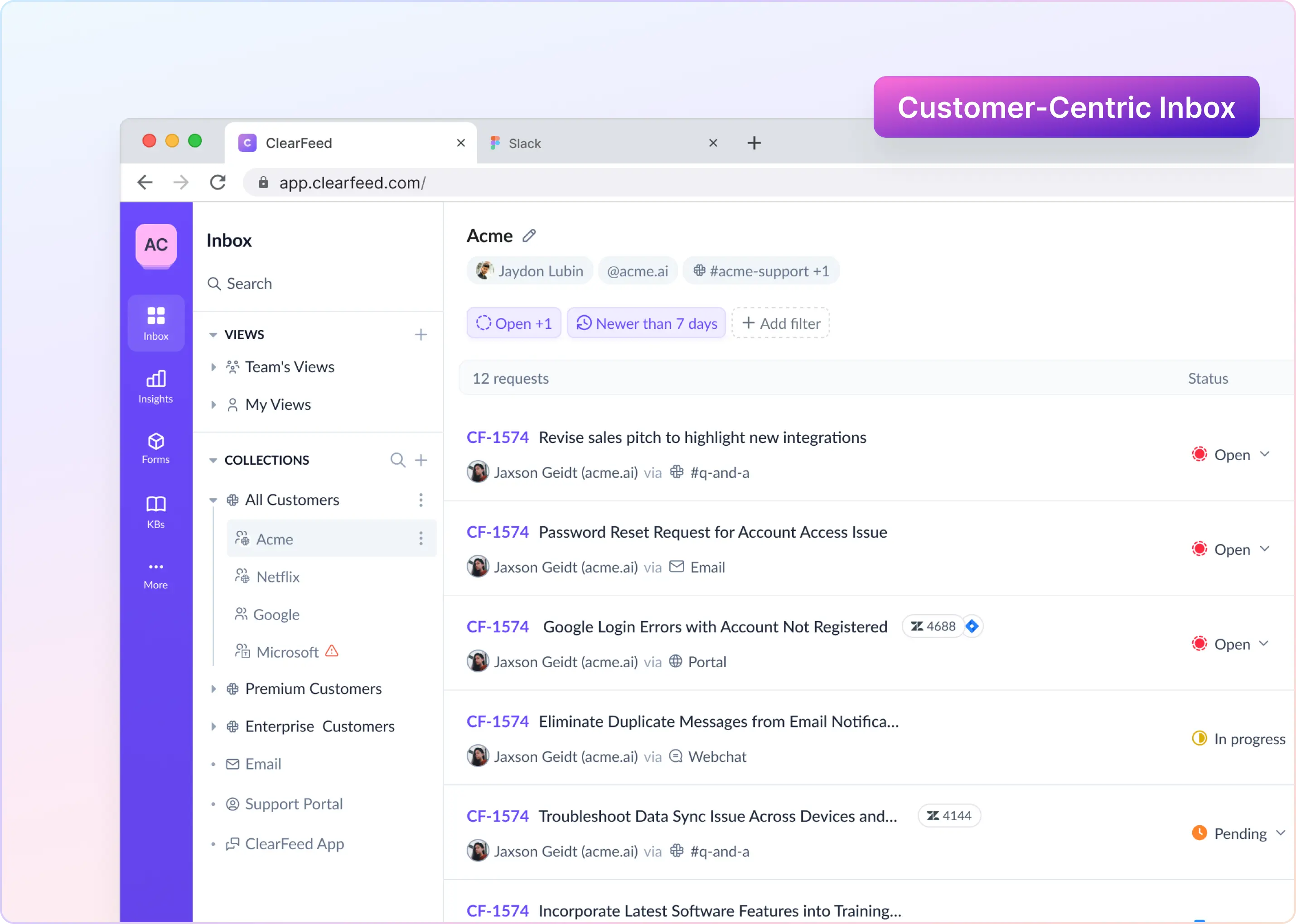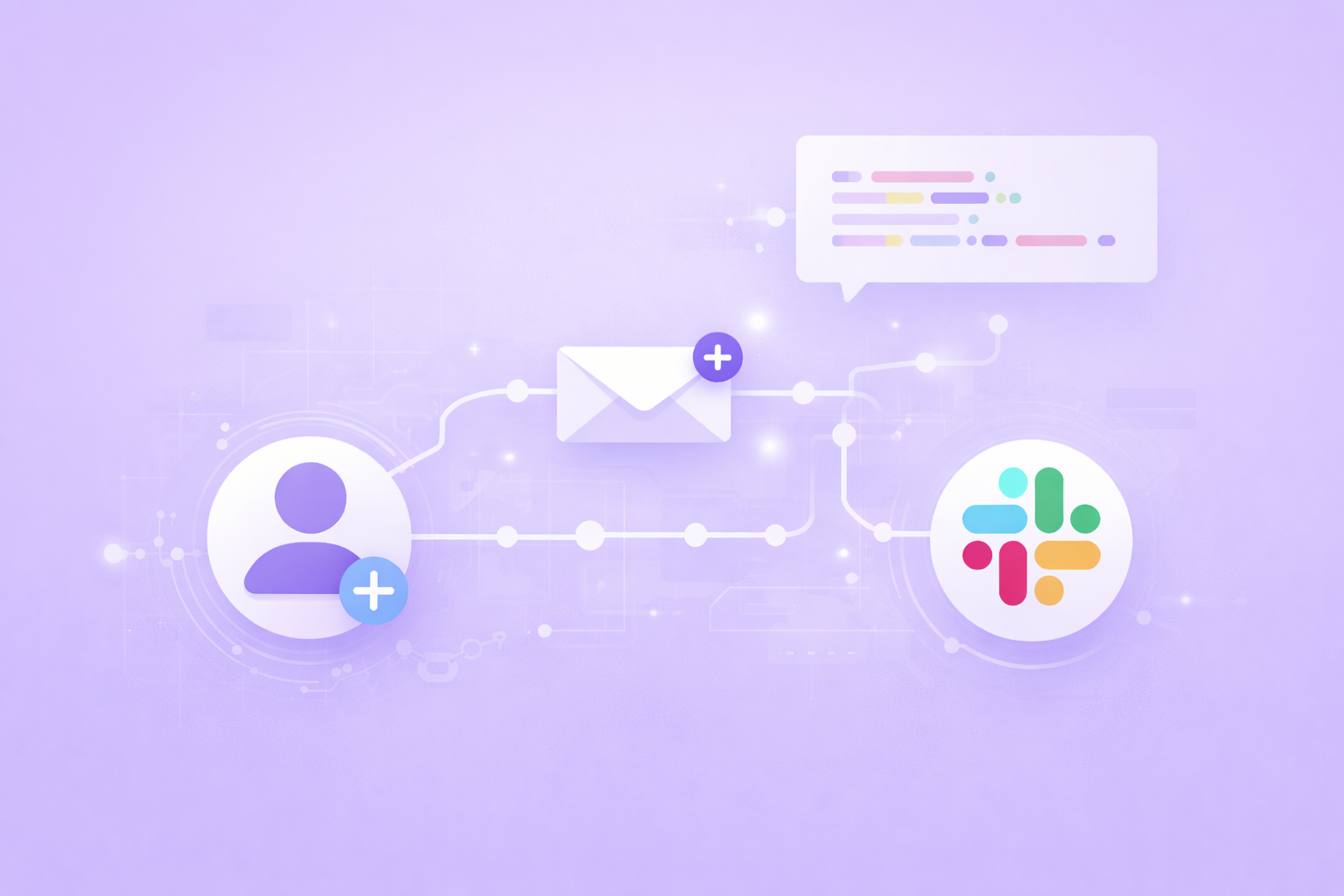Support is already conversational. A customer drops a question in a shared channel, someone replies in-thread, a second teammate adds context, and the issue gets resolved in a way that feels fast and human.
The problem is what happens behind the scenes. In chat-first support, “work” can look exactly like “messages.” Ownership gets fuzzy, follow-ups slip, and the moment you need reporting, handoffs, or a reliable history, the conversation starts to fall apart.
That’s where conversational support comes in. It’s an approach that keeps the experience natural for the person asking, while giving the team enough structure to route, track, and learn from requests without forcing everything into rigid forms or slow back-and-forth.
In practice, teams adopt conversational support software when they want to keep conversations intact while still running support like a system: clear accountability, consistent triage, and a single timeline that holds up even when the request spans people, tools, and channels. The same model also shows up in internal environments as a conversational service desk, where employees expect help to feel like a conversation, not a ticketing ceremony.
What Is Conversational Support?
Conversational support is a way of running support where the “unit of work” is the conversation itself. Not a form. Not a ticket someone has to create. The conversation is where the request starts, where context builds, and where the resolution happens, without forcing the person asking for help to switch modes halfway through.
In conversational customer support, the goal is simple: keep the experience human and immediate for the customer, while still making the work reliable for the team. That means every request has an owner, the right people get looped in at the right time, and nothing important gets lost in a thread that scrolls away.
It’s also different from plain conversation support, where teams just reply in chat and hope for the best. Chat alone gives you speed, but it doesn’t automatically give you accountability, consistency, or visibility.
How Is Conversational Support Different From Ticketing?
Traditional ticketing treats the ticket as the center of gravity. Someone fills out a form, the request becomes a record, and the conversation is a side thread that supports the record. That works fine when your world is email or portals, and when the person asking for help expects a structured intake.
Conversational support flips that model. The conversation is the starting point and the source of truth. The team’s job is to preserve that context while still running a disciplined workflow behind it, so the person asking doesn’t feel like they’re being pushed into a process they didn’t sign up for.
The tension shows up in three places.
- Ownership: In a ticketing world, ownership is explicit from the start. In chat, it can be ambiguous unless you add a system that makes “who’s on it” unmistakable.
- Follow-through: Tickets naturally create queues and reminders. Conversations naturally create… more conversations. Without structure, important requests can get buried under newer messages.
- Visibility: Ticketing tools make it easy to report on status and volume. Chat makes it easy to move fast, but hard to answer basic questions like what’s pending, what’s blocked, and what keeps repeating.
Where Does Conversational Support Happen?
Most teams don’t “switch” to conversational support. They wake up one day and realize they’re already doing it.
It shows up anywhere customers can talk to you in real time or near real time. A shared Slack channel. A Teams thread. A live chat widget. A WhatsApp message. A DM that turns into a real issue. The moment support moves into messaging, the conversation becomes the work surface, whether you planned for it or not.
The tricky part is that conversations don’t stay neatly in one place. A request might start as conversational customer support in chat, but pull in product or engineering over Slack, get clarified over email, and end with a quick follow-up message a week later. If you don’t preserve a single timeline and a clear owner through that hop, you end up re-litigating context and losing momentum.
That’s why the best conversational support software isn’t defined by “chat” alone. It’s defined by how well it can keep the conversation intact while it moves across people, tools, and channels, without turning every interaction into a slow ticketing ritual.
And inside companies, the same pattern plays out as a conversational service desk. Employees ask for help the way they ask a colleague: a quick message, a screenshot, a question in a shared channel. The expectations are conversational. The operations still need to be dependable.
What Makes Conversational Support Actually Work
If you strip away the buzzwords, conversational support only succeeds when it protects two things at once: a natural experience for the person asking for help and a dependable system for the team doing the work.
That balance usually comes down to a few fundamentals.
- Clear ownership. Someone has to “have” the request, even if five people are chiming in. Without that, conversation support turns into a friendly group chat where problems get solved eventually, but never predictably.
- Lightweight triage. Not every message deserves the same response. Some are quick clarifications. Some are real issues that need follow-ups, cross-team help, or a timeline. Good teams make that distinction early, then move on without making the requester do extra work.
- A conversation that stays intact even when work spreads. The moment the context fractures, you lose speed. The same question gets asked twice. Decisions live in someone’s head. Updates happen in private threads. This is where a solid conversation timeline matters, not as a “nice to have,” but as the thing that keeps support from turning into archaeology.
- A graceful handoff from chat to tracked work. A lot of teams end up with conversational ticketing here. You keep the discussion flowing, but when a request becomes important enough to track, it becomes trackable without forcing everything into a rigid intake process.
- Learning. The best setups don’t just resolve requests. They reduce repeats by capturing patterns, updating answers, and making sure the next person doesn’t start from scratch. That’s usually why teams invest in conversational support software in the first place. It’s not to “add process.” It’s to keep the conversation flowing while running support as it can scale.
What Conversational Support Looks Like in Practice
Picture a customer asking a question in a shared channel. It starts simple: “Hey, is this expected behavior?” Within minutes, you’ve got logs, screenshots, and three different teammates weighing in. The conversation becomes the case file, even though nobody called it that.
In a healthy conversational customer support setup, a few things happen quietly in the background. One person owns the request. The right specialist gets pulled in without repeating context. Updates stay in one place. And when the issue is bigger than a quick reply, the team can shift to conversational ticketing without breaking the flow or making the customer start over.
Now, take the same pattern inside a company. An employee posts in an IT channel: “Laptop VPN keeps dropping.” Others chime in, someone shares a workaround, another asks for device details, and suddenly it’s a real incident. A conversational service desk works when that thread doesn’t just “feel helpful,” it becomes trackable, handoff-friendly, and easy to audit later, with a clean conversation timeline that survives beyond the moment.
This is the difference between chatting and running conversational support as a system. The experience stays natural, but the work doesn’t rely on luck, memory, or who happened to see the message first. That’s also why teams look for conversational support software that can maintain context while still providing routing, accountability, and visibility when the conversation turns into real work.
Why Teams Move to Conversational Support
The biggest win is speed without chaos. When support happens in the same place where customers already talk, questions get answered faster, and issues get resolved with less back-and-forth. Conversational customer support feels natural because it mirrors how people actually communicate.
The second win is context. In email, context gets split across threads. In chat, it gets buried in a scroll. A strong conversation timeline keeps the full story together, so the next person who joins doesn’t have to ask for the same details again.
Then there’s collaboration. Conversational customer service makes it easier to pull in product, engineering, or success at the exact moment it matters, without turning the request into a long internal relay race. The customer sees progress, not handoffs.
Teams also adopt conversational support to reduce repetitive work. When patterns emerge in support conversations, the team can turn them into better responses, documentation, and defaults. Over time, fewer requests start from scratch.
And finally, there’s reliability. Chat is great until something gets missed. That’s where conversational support software earns its place, especially when the team needs clear ownership, consistent triage, and a clean handoff into conversational ticketing for the issues that deserve tracking. The same benefits apply internally with a conversational service desk, where employees want quick help, but the business still needs accountability.
When Conversational Support Breaks Down
It usually doesn’t fail because the team is slow or uncaring. It fails because chat creates the illusion of progress. Lots of messages. Lots of “looking into it.” And then the thread goes quiet, the customer follows up, and nobody is sure what happened or who was supposed to do the next step.
- Fuzzy ownership. In conversation support, everyone can respond, which often means nobody truly owns the outcome. The customer gets partial answers, but the issue doesn’t actually move.
- Lack of a dependable follow-up loop. Chat is great at starting conversations, not great at finishing them. Without a system, important requests get buried under new messages, and work becomes reactive instead of intentional.
- Context drift. When the conversation timeline splinters into side threads, DMs, meetings, or email, the same explanation gets repeated. Details get lost. Decisions become hard to trace. The team ends up doing support archaeology instead of support.
- Treating every message the same way. Some requests are quick clarifications. Others are bugs, incidents, or complex setups that deserve tracking. If you don’t have a smooth way to move from chat to tracked work, teams swing between two extremes: either everything becomes a ticket, or nothing does. That’s why many teams adopt conversational ticketing as a middle path.
And in internal environments, a conversational service desk can break down the same way, just with different stakes. Missed employee requests create frustration, repeated pings, and a lack of trust in the system.
How To Evaluate Conversational Support Software?
If you’re evaluating conversational support software, don’t start by asking whether it “supports chat.” Almost everything does now. The real question is whether it can keep the work reliable without making the experience feel like ticketing with a new coat of paint.
- Start with ownership. Can a request clearly have an owner in the conversation, and can that ownership change cleanly during a handoff? If it’s hard to tell who’s responsible, the tool will amplify the same ambiguity you’re trying to fix.
- Look at triage. Can you separate quick questions from real issues without forcing the requester to fill out forms? A good system makes it easy to route, prioritize, and categorize behind the scenes while the conversation stays natural on the surface.
- Audit the conversation timeline. Does the full context stay readable when multiple people reply, when updates happen later, or when the conversation jumps across channels? If the timeline breaks, you’ll keep paying the tax of repeated explanations and missed details.
- Focus on how it handles tracked work. This is where conversational ticketing matters. Can the conversation be trackable when needed, without turning every interaction into a ticket? Can tracked work still feel conversational, with updates and resolution happening in the same thread?
- You should also check whether it supports how your team actually collaborates. In conversational customer support, that often means pulling in engineering, product, or success without losing context. In a conversational service desk, it can mean internal approvals, access requests, and audit trails that don’t require extra tools and manual copying.
- Measure learning. The best systems help you reduce repeats by capturing patterns from conversational support and turning them into better answers over time, whether that’s through faster responses, better knowledge, or smarter workflows.
If a tool looks impressive but still forces your team to copy context, chase updates, or rebuild history across multiple places, it might be “chat-enabled,” but it won’t actually scale conversational customer service as the term promises.
How To Roll Out Conversational Support Without Losing Control?
Most teams don’t need a big migration plan. They need a few decisions that make conversational customer support predictable, even when the volume grows.
- Start by choosing where requests can begin. If everything can start anywhere, you’ll spend your life chasing context. Pick a small set of entry points, then make those points feel responsive and safe for customers to use.
- Define what “triage” means in your world. In chat, triage is not a form. It’s a quick, consistent way to decide whether something is a fast answer, a follow-up, or real work that needs tracking. This is where teams usually shift from loose conversation support to a system that can scale.
- Decide your threshold for tracked work. Not every message deserves a ticket, but some absolutely do. A clean conversational ticketing workflow gives you a graceful moment when the conversation stays intact while the work becomes visible, assignable, and measurable.
- Protect the conversation timeline. Make it obvious where updates will be posted, where decisions should live, and how handoffs happen without starting a parallel thread that only half the team can see. If the timeline fractures, everything else gets harder.
- Keep the rollout grounded in real examples. Take 10 recent conversations, map how they should have flowed, and turn that into a simple playbook. When you add conversational support software on top of those patterns, you’re not adding process for its own sake. You’re reinforcing what already works, and removing the parts that keep breaking.
Frequently Asked Questions
1. Is Conversational Support Just “Support Over Chat”?
Not really. Chat is the surface. Conversational support is the operating model underneath, where the conversation stays intact while the work retains ownership, follow-through, and visibility. Without that system layer, you’re just doing conversation support, which can feel fast until it starts slipping.
2. Do I Need Conversational Support Software To Do This?
You can start the mindset without tooling, but it gets messy fast. The moment you have multiple channels, multiple responders, or anything that needs tracking, you’ll want conversational support software that keeps a clean conversation timeline and makes ownership obvious without forcing people into forms.
3. How Is This Different From Conversational Ticketing?
Think of conversational ticketing as a tactic inside conversational support. You keep the discussion flowing, but when a request becomes important enough to track, it becomes trackable without breaking the thread or making someone restate everything from scratch.
4. Does Conversational Support Work for Internal Teams, Too?
Yes, and it often matters even more because the volume can be high and the expectations are immediate. That’s where you’ll hear teams talk about a conversational service desk. Same concept, different audience: employees want help to feel like a conversation, and the company still needs accountability and history.
5. What Should I Measure if I Move to Conversational Customer Support?
Start with the basics that reflect reality: time to first response, time to resolution, the percentage of requests with clear ownership, and how often issues are reopened because context was lost. If your conversation timeline stays intact, the metrics get easier to trust.


















